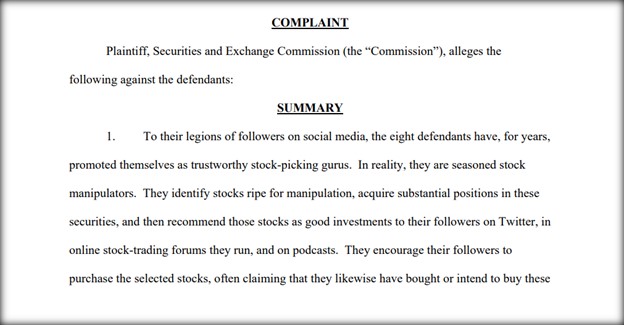
Social Media and Stock Message Boards Again Help Amplify Market Manipulators
There is an ongoing government investigation after the Securities and Exchange Commission (SEC) charged seven podcasters and social media influencers with stock market manipulation. The benefit to those charged totals near $114 million as they allegedly ran a pump while they were dumping scheme. According to the SEC, the charges are against eight Twitter users that also used stock trading message boards on Discord, and a podcast to promote specific stocks to “hundreds of thousands of followers.” Meanwhile, they are said to have quietly sold into the run-up they helped create in the stocks’ prices.
The fraud they are being charged with began at the dawn of the pandemic in January 2020 and involved participants from various locations, including defendants from Texas, California, New Jersey, and Florida.
The main podcaster named in the case (Knight) is suspected of and also charged in the illicit trading scheme as having used influence to promote the others as expert traders, according to the SEC. Among the most called upon stocks used in the alleged scheme were Gamestop (GME), and AMC Theaters (AMC) – two darlings of newer investors that saw a rise in popularity beginning during the stimulus check, lockdown period in 2020. This period in market history helped usher in many brand new investors with time to listen to podcasts, follow social media posts, enjoy market-related memes, and benefit from a rising overall market.

The criminal charges include conspiracy to commit securities fraud and, for several of the defendants, multiple counts of securities fraud. Each of the charges carries a maximum possible sentence of 25 years in prison. The Justice Department simultaneously filed separate criminal fraud charges against the defendants, the SEC said.
The SEC’s complaint calls for the US District Court for the Southern District of Texas to impose fines and to require that the defendants give up their allegedly ill-gotten gains, along with a ban on future misconduct.
The SEC’s Summary of the Scheme
From the SECs court filing:
The Defendants engaged in a long-running fraudulent scheme to manipulate
securities by publishing false and misleading information in online stock-trading forums, on
podcasts, and through their Twitter accounts. The Primary Defendants, aided and abetted by
Knight, engaged in a pattern of conduct, sometimes referred to as “scalping,” in which they
recommended the purchase of a particular stock without disclosing their intent to sell that stock.
They generally executed their scheme in three phases. First, one or more of the Primary
Defendants identified a security to manipulate (the “Selected Stock”) and purchased shares of
that particular security. By sharing the name of the Selected Stock among some or all of the
group, the Defendants provided each other with the opportunity to purchase shares at lower
prices prior to the manipulation. Next, they promoted the stock to their followers on podcasts
and/or social media platforms in order to generate demand and inflate the share price. Typically,
the Primary Defendants announced price targets, teased upcoming news about the company,
and/or stated their intention to buy shares or hold their current positions for longer periods.
Finally, after promoting the stock to their followers in these ways, the Primary Defendants sold
their shares into the demand generated by their recommendations. When the scheme succeeded,
the Primary Defendants were able to sell their shares at higher prices and make profits. In order
to cover up their scheme and continue perpetrating it, the Primary Defendants at various points
deleted old tweets and Discord chats, and lied to their followers about the reasons why particular
stock picks were followed by declines in the prices of those stocks, obscuring their own roles in
causing losses among their followers and other retail investors.
None of the Primary Defendants disclosed that they were either planning to sell,
or were actively selling, a Selected Stock while recommending that their followers buy it. Nor
did any of the Primary Defendants disclose that they were coordinating with each other to
manipulate the price and volume of trading in the stocks they were promoting. Moreover, the
Primary Defendants’ deception extended beyond their omissions and outright lies about their
intentions regarding, and views about, the securities they were promoting. For instance,
sometimes they peddled false or misleading news about particular stocks through social media or
podcast interviews. On some occasions, the Primary Defendants lied about losing money on a
particular stock when in reality they had profited handsomely, in order to generate trust among
their followers—trust that was necessary to perpetuate the scheme and ensure that their followers
would continue to purchase shares based on their future recommendations. Indeed, in private
chats and surreptitiously recorded conversations, they bragged and laughed about making profits
at the expense of their followers.
Defendants’ specific roles in the fraudulent scheme varied depending on the
timeframe and the specific security at issue. Typically, only a subset of the Primary Defendants
participated in the manipulation of a particular stock. Those Primary Defendants would agree on
a Selected Stock in which they would each establish a position (i.e., “load” or “load up” on the
stock). After loading up on the Selected Stock, most, if not all, of the Primary Defendants who
had established positions in that stock would recommend it to their followers. The Primary
Defendants often referred to “swinging” or taking a “swing” position in the stock, by which they
conveyed to their followers that they intended to hold onto the stock for at least a day and likely
longer. As the primary defendants involved in the deceptive heralding of a particular stock
often informed other defendants of their plans, those not directly promoting the stock could,
and many times did, take advantage of the advanced knowledge by purchasing the Selected Security, in
advance of the promotion, and selling the Selected Security at inflated prices that resulted from
the promotion. Over the course of the ongoing scheme, all of the primary defendants, aided and
abetted by Knight, engaged in this conduct, participating directly in scalping and other deceptive
conduct, and all of the Defendants profited from the knowledge that others were doing so.
The Primary Defendants deceptively promoted stocks through three channels:
stock-trading forums on Discord; podcasts; and Twitter.
Take Away
Fraud in the securities market is almost as old as the markets themselves. While the SEC exists to protect investors, the best person to protect oneself is yourself. When consuming investment advice, ask yourself how well you know where the advice is coming from. What is the persons background, for example, are they credentialed with a CFA or guided by the responsibilities that FINRA registrations enforce. Are they ranked by a third-party entity as to their stature?
The alleged pump and dump scheme being investigated and prosecuted by the SEC only exists because people tend to follow the crowd, after-all crowds seem safe. Successful long-term investing often involves more thought than following others into a trade. There are true stock analysts that can help investors sort through all the opportunities, but in the end, the individual investor still needs top ask if it makes sense, does it feel right, and it is likely to match investment goals.
On December 15, Channelchek along with veteran stock analysts, provided registered users of Channelchek their thoughts on a select few companies they cover. If you were not able to attend live, register for Channelchek emails (no cost) now to learn when these extremely insightful presentations will be available online. At a minimum, I promise one will immediately see the difference between a stock market social media influencer and how they make recommendations (tout stocks), and professional equity analysts that ignores hype and instead drills down to best assess the future prospects of a company. Sign up for Channelchek notifications here.
Managing Editor, Channelchek
Sources